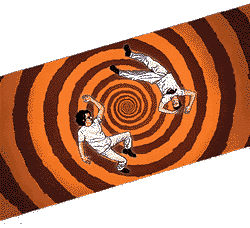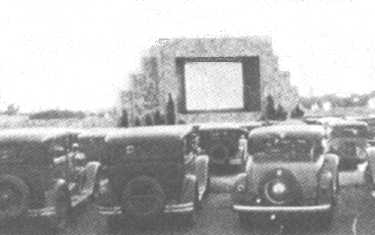The Drive-In Theater History Page
Strap on the seat belts as your cyber time machine takes you on a journey to the past.

Select Your Destination
- Meet the inventor of the Drive-In Richard M. Hollingshead, Jr.
- Visit the first drive in built in 1933
- Visit the location 18 Drive-Ins built between 1933 and 1939
- See the rise and fall of Drive-In theaters 1948-1987
- Check out Drive-In oddities (largest, smallest, etc.)
- John Wayne goes to the drive-in 1969
- From early Drive-In sound systems to the present day
- Take a trip to the 1980's, where are all the drive-ins going

The Inventor
As our cyber time machine stops we find a man by the name of Richard M. Hollingshead, jr. in his 30's. He is the sales manager for Whiz Auto Products Company, which his father owns. Richard is not challenged in his position so he strikes out on his own to create his own invention. He studies the American culture at the time. Richard finds that one of the last thing people would give up are the movies. In the 1930's attending the movies was not a family activity. Children went to matinees during the day and adults dressed up and went to movies in the evening. This created many obstacles. After a long day at work on Friday dad did not want to dress up, mom had to find a baby sitter. You had to find a place to park the car, sometimes had to pay to park (remember in the 1930's most theaters were on main streets with little parking).
Richard's idea was to create an open air theater where you can watch movies from you car! You can bring the kids in their pajamas, dad does not have to dress up after that hard day at work and mom does not have to find a baby sitter. So Richard began to experiment in the driveway of his home at 212 Thomas Avenue, New Jersey. Richard mounted a 1928 Kodak projector on the hood of his car, he used it to project onto a screen he had nailed to trees in his backyard. He placed a radio behind the screen for sound, then started his test of his idea. Richard tested sound with the windows up, down and half way. He tested many weather conditions, using his lawn sprinkler he simulated a rainstorm. Richard liked what he saw and heard.
One main problem did arise in his test. That was if cars were parked behind each other, the cars at the rear would not be able to see the whole picture, due to the car in front. This did not stop Richard, he lined up cars in his driveway spacing them at various distances and placing blocks under their front wheels he was able to find the correct spacing and the correct angles to build ramps for the cars front tires to park on. Thus was born the first Patent for the Drive-In Theater.
United States Patent 1,909,537
Next we find Richard at the US Patent Office on August 6, 1932. He is explaining about his invention. On May 16, 1933 he get a patent # of 1,909,537 the first Drive-In Theater patent ever. Later in May of 1950 the patent was declared invalid by the Delaware District Court.


The First Drive-In Theater 1933
The date is May 19, 1933 Richard H. along with 3 other investors, Willie Warren Smith, Edward Ellis and Oliver Willets, start construction. After three weeks and $30,000 the first Drive-In Theater opens on Tuesday June 6, 1933. On Crescent Boulevard, Camden New Jersey. By the name of "Drive-In Theatre" with admission price of 25 cents for the car, 25 cents per person and no car to pay more that $1.00 total.




List of Drive-In Theaters Started 1933-1939
Hang on as our cyber time machine takes us on a 6 year trip across the US. to see when and where drive-ins spring up
- Drive-In Theatre: Camden, New Jersey. June 6, 1933
- Shankweiler's Auto Park: Orefield, Pennsylvania. April 15, 1934
- Drive-In Short Reel Theater: Galveston, Texas. July 5, 1934
- Pico: Los Angeles, California. September 9, 1934
- Weymouth Drive-In Theatre: Weymouth, Massachusetts. May 6 1936
- Starlight Auto Theatre: Akron, Ohio. Summer, 1937
- Lynn Open Air Theater: Lynn, Massachusetts. July, 1937
- Providence: Providence, Rhode Island. July 21, 1937
- Miami Drive-In: Miami, Florida. February 25, 1938
- Detroit Drive-In: Detroit, Michigan. June 2, 1938
- Cleveland: Cleveland, Ohio. June, 1938
- Shrewsbury Drive-In: Shrewsbury, Massachusetts. June, 1938
- San-Val: Burbandk, California. June 10, 1938
- Merrimack Auto Theatre: Methuen, Massachusetts. Summer, 1938
- Valley Stream: Long Island, New York. August 10, 1938
- Corpus Christi: Corpus Christi, Texas. March, 1939
- Saco Drive-In: Portland, Maine. July 15, 1939
- Atlantic Drive-In: Jacksonville, Florida. December 6, 1939


Number Of Drive-In Theaters Across America 1948-1987
Hold on as your Cyber Time Machine takes you from 1948 through 1987 to see the rise and fall of Drive-Ins across the US.
Number of Drive-Ins
| Date | Drive-ins |
|---|
| 1948 | 820 |
| 1954 | 3,775 |
| 1958 | 4,063 |
| 1963 | 3,502 |
| 1967 | 3,384 |
| 1972 | 3,342 |
| 1977 | 2,882 |
| 1982 | 2,129 |
| 1987 | 999 |


Drive-In Odities
They said you can't build one that big!
One of the largest Drive-In Theaters was the All-Weather Drive-In , Copiague, New York. parking spaces for 2,500 cars. It also had an indoor 1,200 seat viewing area, that was heated and air-conditioned, a playground, a cafeteria, a restaurant with full dinners. A shuttle train that took customers from their cars to the various areas, on the 28 acres.
- Troy Drive-In: Detroit, Michigan. 3,000 cars
- Panther Drive-In: Lufkin, Texas. 3,000 cars
- All-Weather Drive-In: Copiague, New York 2,500 cars
- 110 Drive-In Melville, New York. 2,500 cars
- Newark Drive-In: Newark, New Jersey 2,400 cars
- Belair Drive-In, Cicero, Illinois. 2,300 cars
- Timonium Drive-In: Timonium, Maryland 2,479 cars
- Los Altos Drive-In: Long Beach, California 2,150 cars
What was the smallest?
- Harmony Drive-In: Harmony Pennsylvania. 50 cars
- Highway Drive-In: Bamberg, South Carolina. 50 cars
- Ponce DeLeon Drive-In: Ponce DeLeon, Florida. 60 cars
- Twilite Drive-In: Nakina, North Carolina. 60 cars
- Norwood: Norwood, Colorado. 64 cars
Not Just Cars but Airplanes "Fly-Ins"
On June 3, 1948, Edward Brown, Jr., a former navy pilot opened the first Fly-In Drive-In Theater. There was room for 500 cars and 25 airplanes. The planes landed at an airfield next to the Drive-In, then could taxi to the last row which was set up for planes. When the movies were over Brown provided a jeep to tow the planes back to the airfield.
- June 3, 1948 Ed Brown's Drive-In and Fly-In, Asbury Park, New Jersey
- 1953 The Roxy Fly-In and Drive-In, St. Ansgar, Iowa
- 1950's "no name" Fly-in, Belmar, New Jersey (75 cents admission for planes)
- 1950's The Air-Sho Fly-in, Mobile, Alabama
- 1950's "no name" Fly-in, Spearman, Texas
Located in 2 States
Here's one for your "oddities" category regarding DI theaters: How many
Drive-Ins reside in two or more states? At least one: The Northfield DI
is located half in Northfield, MA and half in Winchester, NH. You walk
in the snack bar in one state and out in another! I knew you were
wondering.
thanks to
Mike Guyette (mgrafx@monad.net)
The Most Screens
The Autoscope Drive-In in Albuquerque, New Mexico opened in 1960's with 260 screens!!!!!! This theater was designed to have a rear projection screen for each car. One central projector conveyed the image to all the screens at one time, using a series of mirrors. Each screen was 3 by 5 feet. By 1963 there were 2 in Albuquerque. A 120 screen Drive-In like the Autoscope opened in Richland, Washington on May 30, 1973 owned by Lloyd Honey.
The above were a very different type of drive-ins. Help me with a list of the most regular screens, I do remember a 9 screen drive-in in Phoenix, Arizona that is still in operation. If you have any information use Drive-In Form.
Most regular screens reported thus far is: The Show and Swapmeet Drive-In in Fort Lauderdale, FL, has 14 screens. Owned by the Thunderbird Swap Shop in Fort Lauderdale,
huge flea market during the day and movies at night.
Thanks to Mark Reed (reed4@csg.infi.net)

John Wayne

Drive-In Sound

No!!!! they did not have radio sound in 1933. When the first drive-in opened in Camden NJ, they contacted a company by the name of RCA Victor Co. RCA's job was to come up with the sound system, well they did, it was called "Directional Sound". Using 3 main speakers mounted next to the screen, everyone at the drive-in was to here the sound at the same level. There were 2 major problems with this type of sound system.
- Since light travels faster than sound, the sound arrived at the back rows late, it must have been like watching one of those Saturday afternoon karate movies.
- Everyone in the entire drive-in could hear the sound, so could Aunt Jane and Uncle John, plus their cows and chickens miles away.
Trip To the 80's










